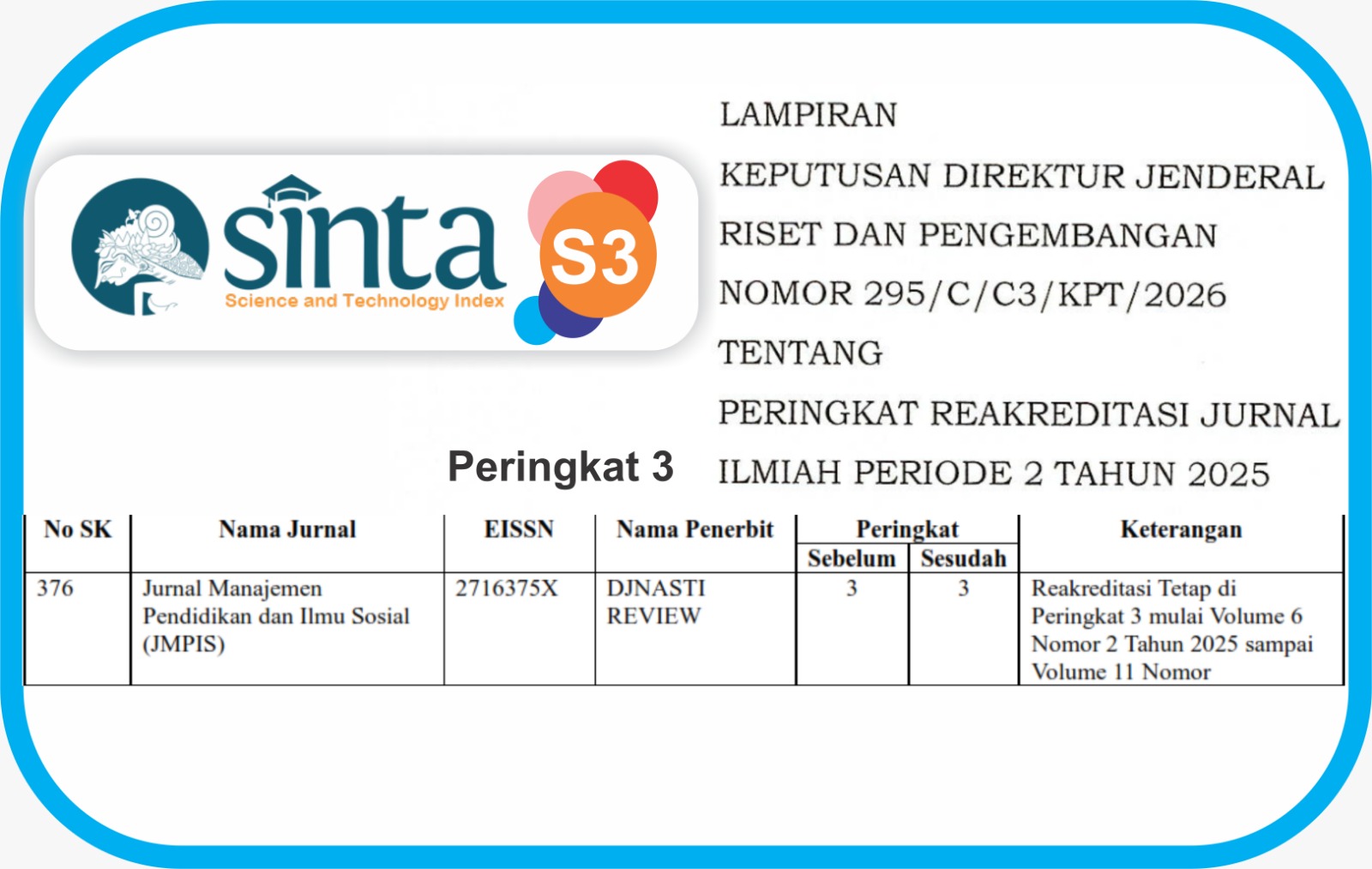Fenomena Thrifting dari Perspektif Gen-Z Indonesia: Pendekatan Metode Campuran
DOI:
https://doi.org/10.38035/jmpis.v5i6.2982Keywords:
Mode Berkelanjutan, Pengetahuan Lingkungan, Model K-A-B, Gen ZAbstract
Penelitian ini bertujuan untuk menganalisis faktor-faktor yang memengaruhi perilaku fashion berkelanjutan di kalangan Gen Z Indonesia, dengan fokus pada peran pengetahuan lingkungan (EK), sikap lingkungan (EA), niat pembelian fashion berkelanjutan (SFPI), dan perilaku fashion berkelanjutan (SFB). Pertumbuhan pesat fast fashion telah menimbulkan tantangan lingkungan dan sosial yang signifikan, termasuk peningkatan limbah dan praktik produksi yang tidak berkelanjutan. Oleh karena itu, pemahaman terkait faktor pendorong perilaku fashion berkelanjutan menjadi sangat penting untuk mendorong pola konsumsi yang lebih ramah lingkungan di kalangan generasi muda. Penelitian ini menggunakan pendekatan metode campuran (mixed-method) dengan menggabungkan data kuantitatif dan wawasan kualitatif dari diskusi kelompok terarah (FGD). Hasil penelitian kuantitatif menunjukkan bahwa pengetahuan dan sikap lingkungan secara kolektif memengaruhi niat pembelian fashion berkelanjutan (R² = 0,514) dan perilaku fashion berkelanjutan (R² = 0,501). Temuan kualitatif dari FGD menunjukkan bahwa partisipan memahami perbedaan antara fast fashion dan fashion berkelanjutan, dengan preferensi pada fashion berkelanjutan karena durabilitas dan manfaat lingkungannya. Penelitian ini menegaskan pentingnya pengetahuan dan sikap lingkungan dalam membentuk perilaku fashion berkelanjutan. Peningkatan edukasi lingkungan dan promosi praktik fashion berkelanjutan dapat memengaruhi niat dan perilaku pembelian. Temuan ini memiliki implikasi penting bagi pembuat kebijakan, pendidik, dan industri fashion dalam mendorong pola konsumsi berkelanjutan.
References
Ahmad, A., Madi, Y., Abuhashesh, M., Nusairat, N. M., & Masa’deh, R. (2020). The knowledge, attitude, and practice of the adoption of green fashion innovation. Journal of Open Innovation: Technology, Market, and Complexity, 6(4), 1–20. https://doi.org/10.3390/joitmc6040107
Ajzen, I. (1991). The Theory of Planned Behavior. https://doi.org/https://doi.org/10.1016/0749-5978(91)90020-T
Balchandani, A., Coe, E., Enomoto, K., Francis, T., & Schmidt, J. (2023, March 20). What is Gen Z?
Bocti, M., Zein, S. A. El, & Giannini, R. (2021). Exploring Antecedents to the Attitude-Behavior Gap for Sustainable Fashion Consumption in Germany. Journal of Sustainable Marketing, 2(2), 32–46. https://doi.org/10.51300/jsm-2021-39
Butler, S. M., & Francis, S. (1997). The Effects of Environmental Attitudes on Apparel Purchasing Behavior.
Defitri, M. (2022, September 2). Sustainable Fashion Brand di Indonesia. https://waste4change.com/blog/brand-tekstil-sustainable-di-indonesia/
Dhir, A., Sadiq, M., Talwar, S., Sakashita, M., & Kaur, P. (2021). Why do retail consumers buy green apparel? A knowledge-attitude-behaviour-context perspective. Journal of Retailing and Consumer Services, 59. https://doi.org/10.1016/j.jretconser.2020.102398
Dragolea, L. L., Butnaru, G. I., Kot, S., Zamfir, C. G., Nu??, A. C., Nu??, F. M., Cristea, D. S., & ?tef?nic?, M. (2023). Determining factors in shaping the sustainable behavior of the generation Z consumer. Frontiers in Environmental Science, 11. https://doi.org/10.3389/fenvs.2023.1096183
Farzin, M., Shababi, H., Shirchi Sasi, G., Sadeghi, M., & Makvandi, R. (2023). The determinants of eco-fashion purchase intention and willingness to pay. Spanish Journal of Marketing - ESIC, 27(3), 348–366. https://doi.org/10.1108/SJME-07-2022-0158
Hair, J. F., Black, W. C., Babin, B. J., & Anderson, R. E. (2019). Multivariate Data Analysis Eighth Edition. www.cengage.com/highered
Heriyanto, D., Utomo, W. P., Pasaman, K. A., Rizka, M. T., Hutauruk, Y. G., & Yulianti, F. (2024). Indonesian Gen Z Report 2024 Understanding And Uncovering The Behavior, Challenges, And Opportunities.
Janmark, J., Magnus, K.-H., Marcos, I., & Wiener, E. (2024, March 28). Sustainable style: How fashion can afford and accelerate decarbonization. https://www.mckinsey.com/industries/retail/our-insights/sustainable-style-how-fashion-can-afford-and-accelerate-decarbonization#/
Jung, S., & Jin, B. (2014). A theoretical investigation of slow fashion: Sustainable future of the apparel industry. International Journal of Consumer Studies, 38(5), 510–519. https://doi.org/10.1111/ijcs.12127
Kallgren, C. A., & Wood, W. (1986). Access to Attitude-Relevant Information in Memory as a Determinant of Attitude-Behavior Consistency. In Journal of Experimental Social Psychology (Vol. 22).
Kim, H. S., & Damhorst, M. L. (1998). Environmental concern and apparel consumption. Clothing and Textiles Research Journal, 16(3), 126–133. https://doi.org/10.1177/0887302X9801600303
Kong, H. M., Ko, E., Chae, H., & Mattila, P. (2016). Understanding fashion consumers’ attitude and behavioral intention toward sustainable fashion products: Focus on sustainable knowledge sources and knowledge types. Journal of Global Fashion Marketing, 7(2), 103–119. https://doi.org/10.1080/20932685.2015.1131435
Kozar, J. M., & Connell, K. Y. H. (2013). Socially and environmentally responsible apparel consumption: Knowledge, attitudes, and behaviors. Social Responsibility Journal, 9(2), 316–325. https://doi.org/10.1108/SRJ-09-2011-0076
Leclercq-Machado, L., Alvarez-Risco, A., Gómez-Prado, R., Cuya-Velásquez, B. B., Esquerre-Botton, S., Morales-Ríos, F., Almanza-Cruz, C., Castillo-Benancio, S., Anderson-Seminario, M. de las M., Del-Aguila-Arcentales, S., & Yáñez, J. A. (2022). Sustainable Fashion and Consumption Patterns in Peru: An Environmental-Attitude-Intention-Behavior Analysis. Sustainability (Switzerland), 14(16). https://doi.org/10.3390/su14169965
Liu, Y., Liu, M. T., Pérez, A., Chan, W., Collado, J., & Mo, Z. (2021). The importance of knowledge and trust for ethical fashion consumption. Asia Pacific Journal of Marketing and Logistics, 33(5), 1175–1194. https://doi.org/10.1108/APJML-02-2020-0081
Manchanda, P., Arora, N., Nazir, O., & Islam, J. U. (2023). Cultivating sustainability consciousness through mindfulness: An application of theory of mindful-consumption. Journal of Retailing and Consumer Services, 75. https://doi.org/10.1016/j.jretconser.2023.103527
Mazanec, J., & Harantová, V. (2024). Gen Z and Their Sustainable Shopping Behavior in the Second-Hand Clothing Segment: Case Study of the Slovak Republic. Sustainability (Switzerland) , 16(8). https://doi.org/10.3390/su16083129
Milfont, T. L., & Duckitt, J. (2010). The environmental attitudes inventory: A valid and reliable measure to assess the structure of environmental attitudes. Journal of Environmental Psychology, 30(1), 80–94. https://doi.org/10.1016/j.jenvp.2009.09.001
Minh, T. C., & Quynh, N. N. T. (2024). Factors affecting sustainable consumption behavior: Roles of pandemics and perceived consumer effectiveness. Cleaner and Responsible Consumption, 12. https://doi.org/10.1016/j.clrc.2023.100158
Moon, D. (2024). Promoting sustainable practices: Exploring secondhand clothing consumption patterns and reductions in greenhouse gas emissions in Japan. Sustainable Production and Consumption, 45, 294–305. https://doi.org/10.1016/j.spc.2024.01.007
Muposhi, A., & Chuchu, T. (2022). Influencing millennials to embrace sustainable fashion in an emerging market: a modified brand avoidance model perspective. Journal of Fashion Marketing and Management, 1–21. https://doi.org/10.1108/JFMM-07-2021-0169
Nuh, A., Misbakul Munir, M., & Muhibban, M. (2023). Fashion engagement and pro-environmental attitudes: drivers of sustainable fashion consumption in Indonesia. Journal of Enterprise and Development (JED), 5(3), 2023.
Oscario, A. (2023). The Transformation of Second-Hand Clothes Shopping as Popular Sustainable Lifestyle in Social Media Era. E3S Web of Conferences, 388. https://doi.org/10.1051/e3sconf/202338804020
Putri, A. D., & Yeshika, A. (2024). The Moderating Role of Generation Differences Determinant Factors of Sustainable Apparel Behavior Intention. Indonesian Journal of Business and Entrepreneurship. https://doi.org/10.17358/ijbe.10.1.154
Rahman, O., & Koszewska, M. (2020). A study of consumer choice between sustainable and non-sustainable apparel cues in Poland. Journal of Fashion Marketing and Management, 24(2), 213–234. https://doi.org/10.1108/JFMM-11-2019-0258
Ritch, E. L. (2015). Consumers interpreting sustainability: moving beyond food to fashion. International Journal of Retail and Distribution Management, 43(12), 1162–1181. https://doi.org/10.1108/IJRDM-04-2014-0042
Rizkalla, N., Lestari, E. D., Arinto, B., Purnamaningsih, P., & Sulistyarini, N. (2022). Uncovering the determinants of environmentally-friendly apparel purchase intention in Indonesia: Incorporating environmental concern and knowledge into the theory of planned behavior. Economics, Management and Sustainability, 7(1), 43–58. https://doi.org/10.14254/jems.2022.7-1.4
Rosidah, R. (2024). Exploring the perception, knowledge, and behavioral tendency to use eco-friendly products of Generation Z in Tangerang Selatan. IOP Conference Series: Earth and Environmental Science, 1324(1). https://doi.org/10.1088/1755-1315/1324/1/012087
Seock, Y. K., Shin, J., & Yoon, Y. (2024). Embracing environmental sustainability consciousness as a catalyst for slow fashion adoption. Sustainable Development. https://doi.org/10.1002/sd.2889
Shwetha G Y. (2019). A Descriptive study on Attitude of Generation Z towards Green Behaviour. Cape Comorin Publisher, 1(1), 24–28. https://archive.org/details/07-shwetha-g-y
Somad, K. Mohd. S. Abd., & Fatmasari, A. E. (2024). Predicting Sustainable Consumption Behavior among Generation Z: Role of Nature Relatedness and Environmental Concern. Psychological Research on Urban Society, 7(1). https://doi.org/10.7454/proust.v7i1.1154
Stephens, S. H. (1985). Attitudes toward socially responsible consumption: development and validation if a scale and investigation of relationships to clothing acquisition and discard behaviours.
Syarief, E. (2022). International Journal of Energy Economics and Policy The Effect of Environmental Care, Environmental Knowledge, and Perceived Consumer Effectiveness on Attitudes and Buying Intentions of Electric Vehicles. International Journal of Energy Economics and Policy |, 12(5), 505–511. https://doi.org/10.32479/ijeep.10845
Syauqina, Z., Haribowo, P., & Hidayat, Y. A. (2022). Influence of Environmental Knowledge and Fashion Consciousness on Green Purchase Intention of Sustainable Fashion Products (Vol. 23). https://jurnal.polines.ac.id/index.php/admisi
Tidswell, E. (2023). Does Gen Z Care About Sustainability? Stats & Facts In 2023. https://goodmakertales.com/does-gen-z-care-about-sustainability/
Tran, K., Nguyen, T., Tran, Y., Nguyen, A., Luu, K., & Nguyen, Y. (2022). Eco-friendly fashion among generation Z: Mixed-methods study on price value image, customer fulfillment, and pro-environmental behavior. PLoS ONE, 17(8 August). https://doi.org/10.1371/journal.pone.0272789
Turunen, L. L. M., & Gossen, M. (2024). From Preloved to Reloved: How Second-Hand Clothing Companies Facilitate the Transaction of Used Garments. Journal of Sustainability Research, 6(1). https://doi.org/10.20900/jsr20240002
Vilaningrum, A. D., Maria W, Kristina Yulita, I., Theresia Ernawati, M., & Rahayu, T. (2024). Sustainable Knowledge, Awareness, Attitude And Intention For Gen-Z Sustainable Consumption. Ekombis Review: Jurnal Ilmiah Ekonomi Dan Bisnis, 12(1), 517–526. https://doi.org/10.37676/ekombis.v12i1.
Downloads
Published
How to Cite
Issue
Section
License
Copyright (c) 2024 Puty Febriasari, Thea Geneveva Josephine Jesajas, Dapit Edo

This work is licensed under a Creative Commons Attribution 4.0 International License.
Hak cipta :
Penulis yang mempublikasikan manuskripnya di jurnal ini menyetujui ketentuan berikut:
- Hak cipta pada setiap artikel adalah milik penulis.
- Penulis mengakui bahwa Jurnal Manajemen Pendidikan dan Ilmu Sosial (JMPIS) berhak menjadi yang pertama menerbitkan dengan lisensi Creative Commons Attribution 4.0 International (Attribution 4.0 International CC BY 4.0) .
- Penulis dapat mengirimkan artikel secara terpisah, mengatur distribusi non-eksklusif manuskrip yang telah diterbitkan dalam jurnal ini ke versi lain (misalnya, dikirim ke repositori institusi penulis, publikasi ke dalam buku, dll.), dengan mengakui bahwa manuskrip telah diterbitkan pertama kali di Jurnal Manajemen Pendidikan dan Ilmu Sosial (JMPIS).











































































